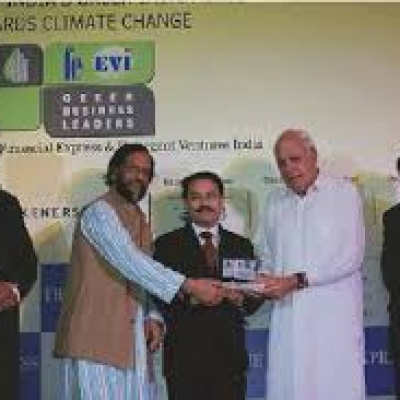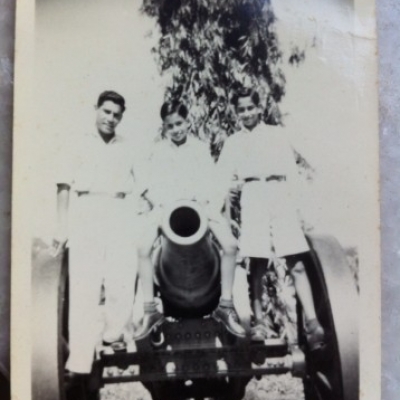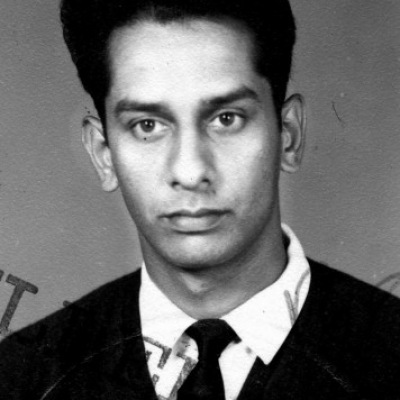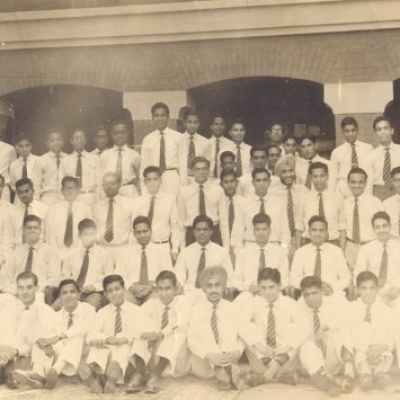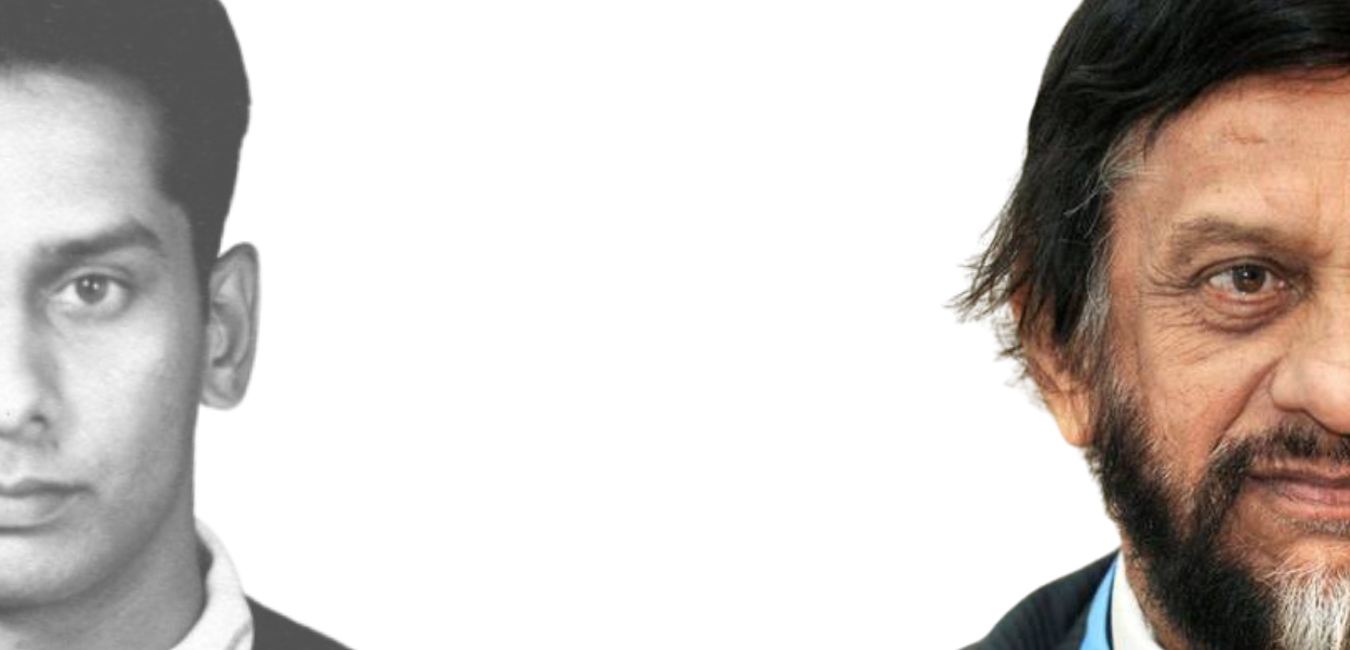
Early Life and Career
Dr. Rajendra Kumar Pachauri was born on 20 August 1940 in the Nainital district of Uttarakhand, India. He received his education at La Martiniere College in Lucknow, Uttar Pradesh and at the Indian Railways Institute of Mechanical and Electrical Engineering in Jamalpur, Bihar.
He belongs to the 1958 Batch of Special Class Railway Apprentices, a prestigious program which heralded the beginning of mechanical engineering education in India. He began his career with the Indian Railways at the Diesel Locomotive Works in Varanasi. He joined North Carolina State University in Raleigh, United States, where he obtained an MS in Industrial Engineering in 1972, and a PhD with co-majors in Industrial Engineering and Economics in 1974. His doctoral thesis was on energy demand forecasting.
He served as Assistant Professor (August 1974 – May 1975) and Visiting Faculty Member (Summer 1976 and 1977) in the Department of Economics and Business at North Carolina State University. He was a Visiting Professor of Resource Economics (August 1981 – August 1982) at the College of Mineral and Energy Resources, West Virginia University, and served as a Visiting Research Fellow (June – September 1990) at The World Bank, Washington, DC. On his return to India, he joined the Administrative Staff College of India, Hyderabad, as Member Senior Faculty (June 1975 – June 1979) and went on to become Director, Consulting and Applied Research Division (July 1979 – March 1981).
Dr. Pachauri assumed his responsibilities as the Chief Executive of The Energy and Resources Institute (TERI) in 1981. He led the institute for more than three decades and demitted office as Executive Vice Chairman of TERI in March 2016. His efforts and dedication ensured that TERI grew from a small documentation center to a multi-dimensional research institute with impeccable reputation over the world. Under his leadership, TERI undertook pioneering work in the field of climate change and sustainable development, with over 1200 employees.
Between April 2002 and February 2015, Dr. Pachauri served as the Chairman of the Intergovernmental Panel on Climate Change (IPCC), established by the World Meteorological Organization and the United Nations Environment Program in 1988. In 2007, he received the Nobel Peace Prize on behalf of the IPCC, along with former U.S. Vice President Al Gore. The Nobel Prize recognized IPCC for its “efforts to build up and disseminate greater knowledge about man-made climate change, and to lay the foundations for the measures that are needed to counteract such change.” At the Nobel Peace Prize Awards ceremony in Oslo, Norway, Dr.Pachauri referenced his belief to the Hindu philosophy of 'VasudhaivaKutumbakam', which means 'the whole universe is one family' in the context of international efforts to protect the global commons.
To acknowledge his immense contributions to the field of environment, Dr. Pachauri was awarded the Padma Bhushan in January, 2001 by the Government of India. In January 2008, the President of India awarded him the “Padma Vibhushan”, India’s second highest civilian honor, for his services in the field of science and engineering. He was also bestowed the “Officier De La Légion D’Honneur” by the Government of France in 2006, and received distinguished awards from the governments of India, Belgium, Finland, Japan, Mexico, Italy, and Somaliland, among several others for his exemplary contribution to the field of climate change and for raising attention of global leaders on the issue. He also received 26 honorary doctoral degrees from universities around the world.
Recognizing his vast knowledge and experience in the energy-environment field, the United Nations Development Program appointed him as part-time advisor to its administrator in the fields of energy and sustainable management of natural resources (1994 - 1999). He taught at the School of Forestry and Environmental Studies at Yale University in the United States as a McCluskey Fellow in the Fall Semester of 2000, and served as the Director of the Yale Climate and Energy Institute (YCEI) from July 2009 to June 2012.
Dr Pachauri's wide-ranging expertise resulted in his membership of various international and national committees and boards. At the international level, these included his positions as Advisor, International Advisory Board, Toyota Motor Corporation, Japan, April 2006 onwards; Member, Board of the International Solar Energy Society (1991 - 1997); Member, World Resources Institute Council (1992); President and Chairman, International Association for Energy Economics, Washington, DC (1988, 1989 - 1990, respectively); and President, Asian Energy Institute (1992 onwards). He also joined the board of the Global Humanitarian Forum, founded by former United Nations Secretary General, Kofi Annan.
At the national level, the committees of the Government of India to which he contributed include the Economic Advisory Council to the Prime Minister of India (July 2001 to May 2004); Advisory Board on Energy, reporting directly to the Prime Minister (1983 - 1988); National Environmental Council, under the Chairmanship of the Prime Minister (November 1993 to April 1999); and Oil Industry Restructuring Group, 'R' Group, Ministry of Petroleum and Natural Gas (1994). He was also a member of the Prime Minister’s Advisory Council on Climate Change.
Dr. Pachauri was associated with several academic and research institutions. He was on the Board of Directors of the Oil and Natural Gas Corporation Ltd (June 2006); Board of Directors of the NTPC Limited (January 2006); Board of Directors of the Indian Oil Corporation Ltd (January 1999 to September 2003); Board of Directors of GAIL (India) Ltd. (April 2003 to October 2004); National Thermal Power Corporation Ltd (August 2002 to August 2005); the Board of Governors, Shriram Scientific and Industrial Research Foundation (September 1987-1990); the Executive Committee and then the Board of Trustees of the India International Centre (IIC), New Delhi (1985 onwards); the Governing Council and President (September 2004 – September 2006) of the India Habitat Centre, New Delhi (October 1987 onwards); and the Court of Governors, Administrative Staff College of India (1979-81)
In September 1999, he was appointed Chairman of the Darjeeling Himalayan Railway Heritage Foundation. Earlier, in April 1999, he was appointed Member of the Board of Directors of the Institute for Global Environmental Strategies, Environment Agency, Government of Japan. He was a member of the Board of Trustees of the India International Centre, Vice President of the Bangalore International Centre, and the President of the India Habitat Centre, New Delhi between September 2004 and September 2006.
